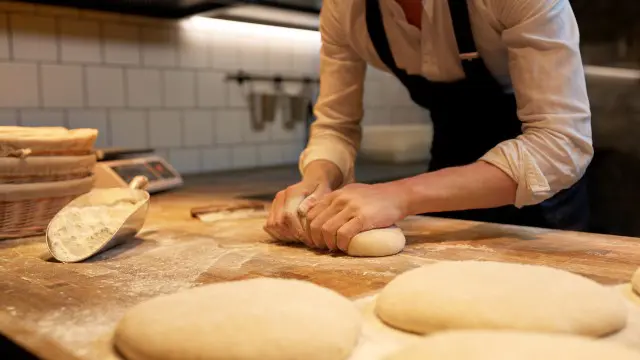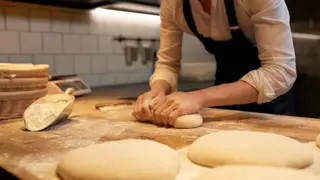
The Art and Creativity in Bread Making
All you need to know about Bread Making | Include Free PDF Certificate & Tutor Support
Learndrive
Summary
- Reed Courses Certificate of Completion - Free
- Tutor is available to students
Add to basket or enquire
Overview
Explore the delightful world of Bread Making in this comprehensive course. From understanding the history and science behind bread to mastering advanced techniques, this course takes you on a journey that combines science and artistry. Whether you're an aspiring home baker or looking to turn your passion into a profession, this Bread Making course provides insights and hands-on experience to elevate your bread-making skills.
Learning Outcome: By the end of this Bread Making course, participants will:
- Gain a deep understanding of the art and science of Bread Making.
- Master various bread-making techniques and methods.
- Create a variety of bread types, from sourdough to specialty loaves.
- Explore the business opportunities and health regulations in Bread Making.
Curriculum
-
Module 1_ Introduction to Bread Making. 09:00
-
Module 2_ Equipment for Bread Making. 07:00
-
Module 3_ Basics of Baking. 09:00
-
Module 4_ Basic Techniques. 08:00
-
Module 5_ Make Your Own Sourdough. 10:00
-
Module 6_ Making Bread Using Straight Dough. 09:00
-
Module 7_ More Recipes. 10:00
-
Module 8_ Speciality Breads. 09:00
-
Module 9_ Business of Bread Making. 09:00
-
Module 10_ Advanced Bread Making Techniques. 09:00
Course media
Description
Step into the world of bread making and unlock your inner baker with this comprehensive course. From the foundational techniques to the artistry of shaping and scoring, this Bread Making course offers a holistic learning experience. Whether you're interested in mastering the perfect loaf or turning your passion into a business, this course is designed to cater to both enthusiasts and aspiring bread entrepreneurs.
Course Curriculum:
Module 1: Introduction to Bread Making
- Unveiling the history of Bread Making.
- Discovering different types of bread.
- Unraveling the nutritional value of bread.
- Exploring the art and science behind bread.
Module 2: Equipment for Bread Making
- Must-have bread-making tools and equipment.
- Getting acquainted with scales, mixing bowls, and more.
- Exploring specialized tools like dough scrapers.
- Baking tins, trays, and their significance.
- Evaluating the pros and cons of bread-making machines.
- Achieving precision with a thermometer.
Module 3: Basics of Baking
- Understanding the key ingredients in bread making.
- Delving into flour, yeast, water, and salt.
- Unveiling the role of gluten in bread.
- Navigating basic baking terminology.
- Emphasizing the importance of accurate ingredient measurements.
- Mastering temperature and timing in baking.
Module 4: Basic Techniques
- Immersing in mixing and kneading techniques.
- Unraveling the magic of proving and fermentation.
- Artistry of scoring: techniques and patterns.
- Best practices in baking and cooling.
- Preserving the freshness and flavor of baked bread.
Module 5: Make Your Own Sourdough
- Understanding the magic of sourdough.
- Crafting a sourdough starter from scratch.
- Baking your first sourdough loaf.
- Tackling common sourdough troubleshooting.
- Elevating sourdough with flavors and shapes.
Module 6: Making Bread Using Straight Dough
- Introduction to the straight dough method.
- Crafting a basic straight dough bread.
- Appreciating the role of each ingredient.
- Shaping, scoring, and creative variations.
Module 7: More Recipes
- Crafting whole wheat bread: recipe and techniques.
- Unveiling the uniqueness of rye bread.
- Exploring the flavors of focaccia: Italian flat bread.
- Mastering the techniques for baguette: crust and interior.
- Indulging in brioche: rich and buttery French bread.
Module 8: Specialty Breads
- Creating gluten-free bread: ingredients and techniques.
- Exploring the world of vegan bread.
- Savoring sweet breads and quick breads.
- Unleashing the power of multi-grain bread.
- Journeying through ethnic and regional breads.
Module 9: Business of Bread Making
- Transitioning from hobby to home bakery.
- Navigating health and safety regulations.
- Packaging and marketing your baked goods.
- Calculating costs and maximizing profits.
Module 10: Advanced Bread Making Techniques
- Elevating bread shaping: artisanal flair.
- Enhancing flavor and texture with pre-ferments.
- Exploring the art of wood-fired oven baking.
- Experimenting with unique grains like spelt and kamut.
- Perfecting your bread with troubleshooting techniques.
Who is this course for?
This Bread Making course is designed for:
- Enthusiastic home bakers eager to master the art of bread making.
- Aspiring bread entrepreneurs interested in starting a bakery.
- Individuals keen on exploring the science and creativity behind bread.
Requirements
This Bread Making Training does not have any prerequisites or formal requirements.
Career path
Taking Bread Making Course will open up a variety of career options for you.
Questions and answers
Currently there are no Q&As for this course. Be the first to ask a question.
Certificates
Reed Courses Certificate of Completion
Digital certificate - Included
Will be downloadable when all lectures have been completed.
Reviews
Currently there are no reviews for this course. Be the first to leave a review.
Legal information
This course is advertised on reed.co.uk by the Course Provider, whose terms and conditions apply. Purchases are made directly from the Course Provider, and as such, content and materials are supplied by the Course Provider directly. Reed is acting as agent and not reseller in relation to this course. Reed's only responsibility is to facilitate your payment for the course. It is your responsibility to review and agree to the Course Provider's terms and conditions and satisfy yourself as to the suitability of the course you intend to purchase. Reed will not have any responsibility for the content of the course and/or associated materials.


